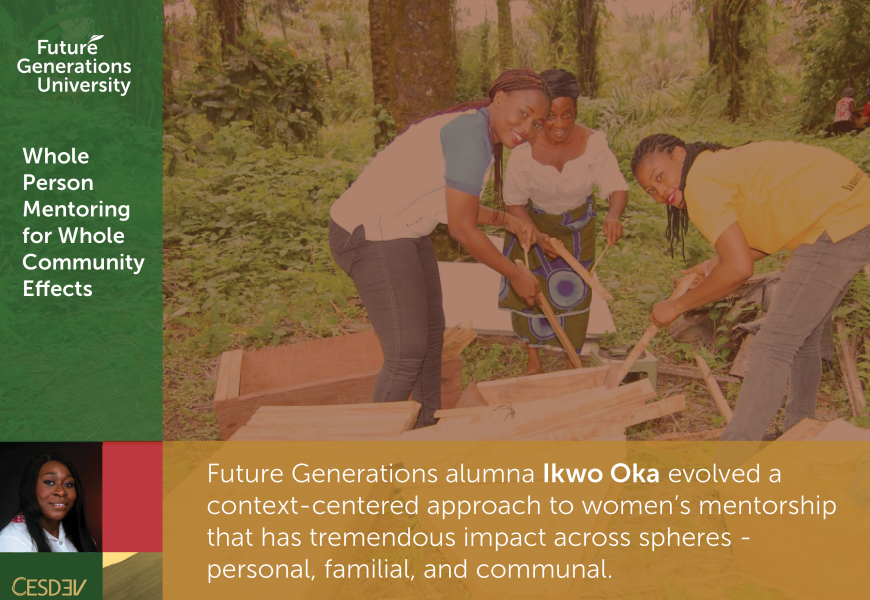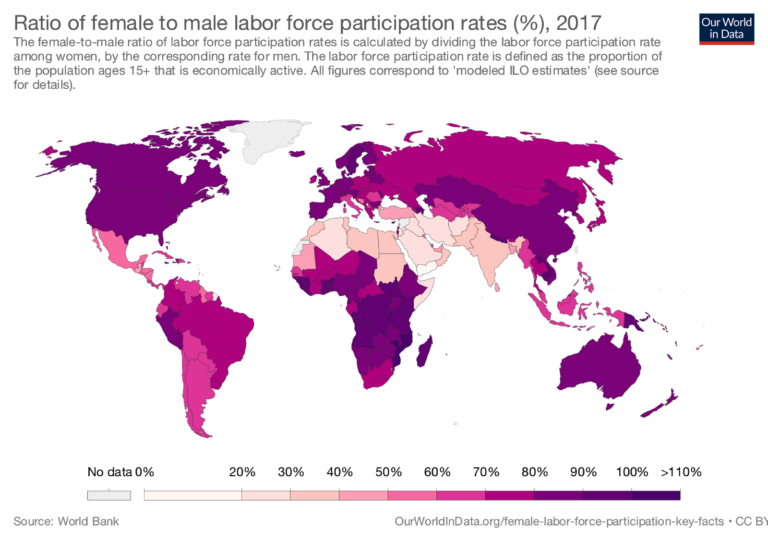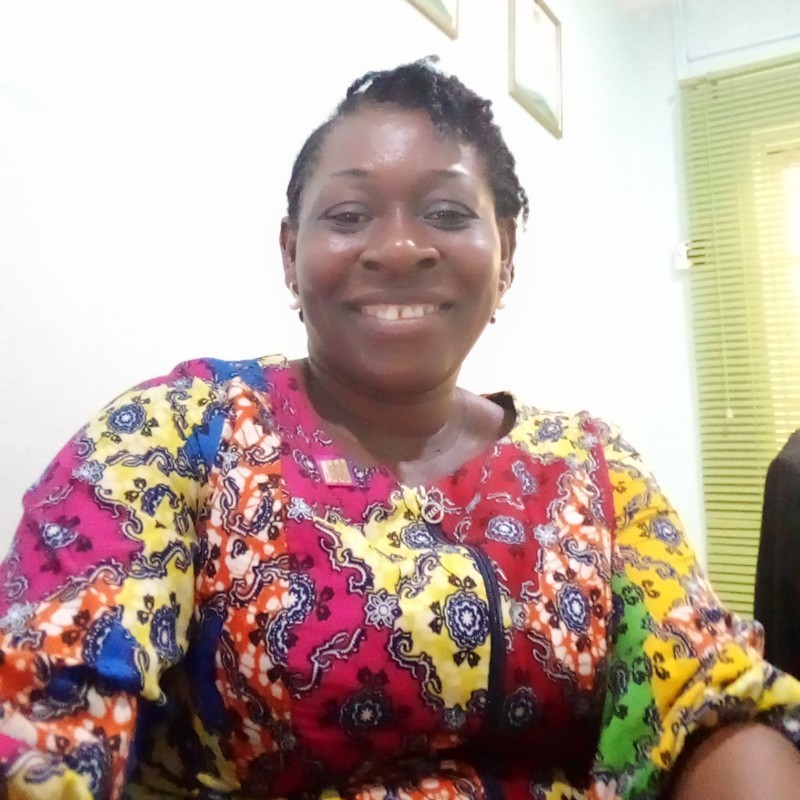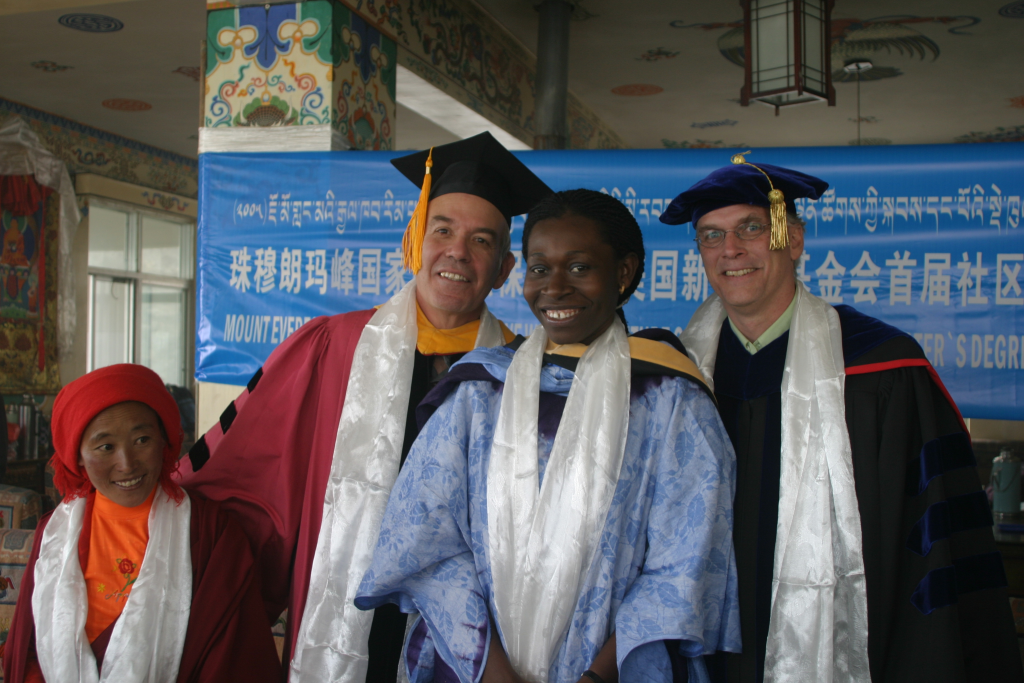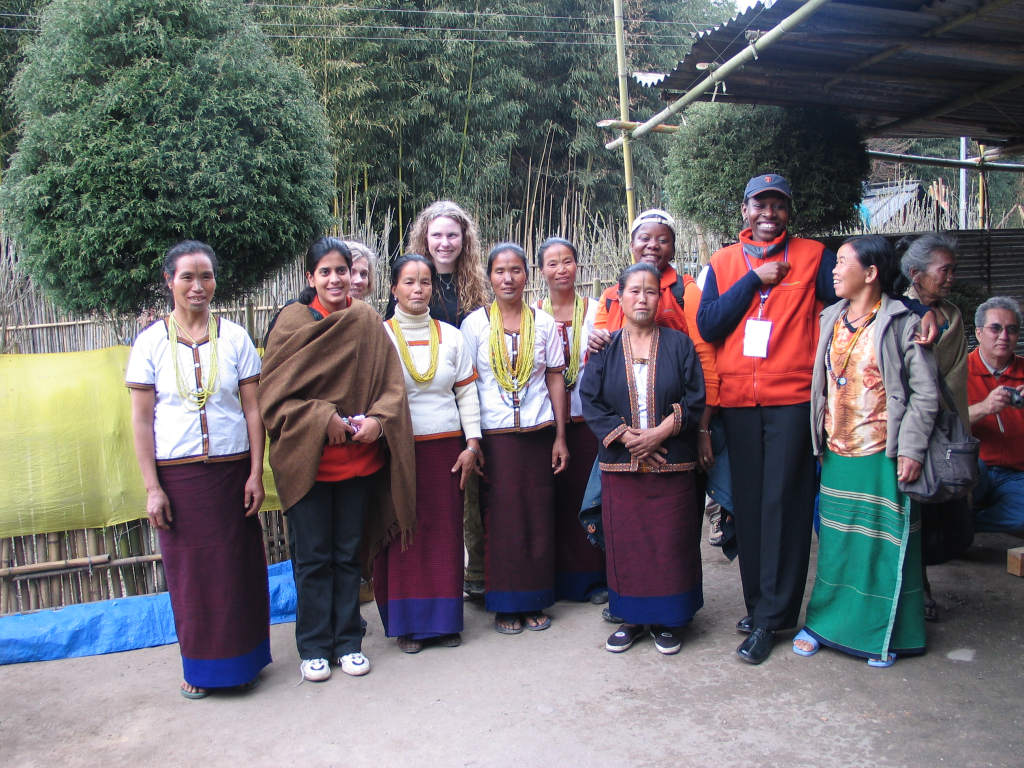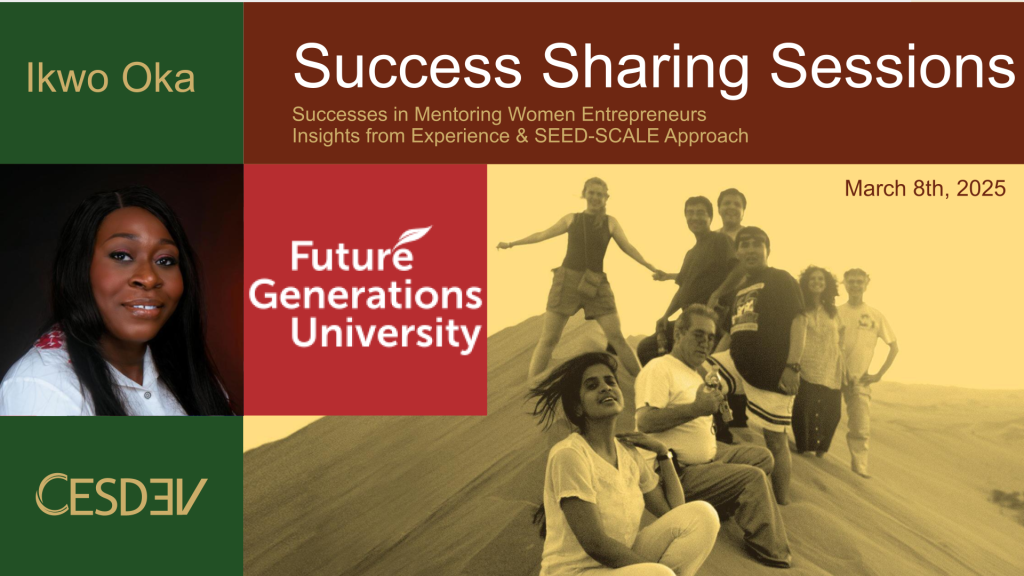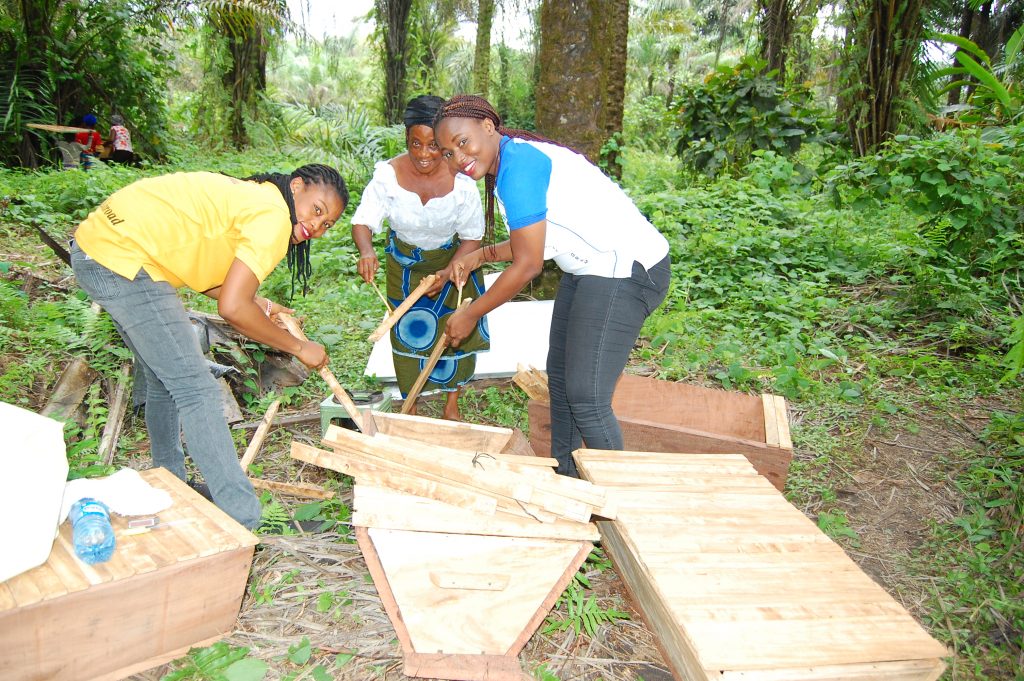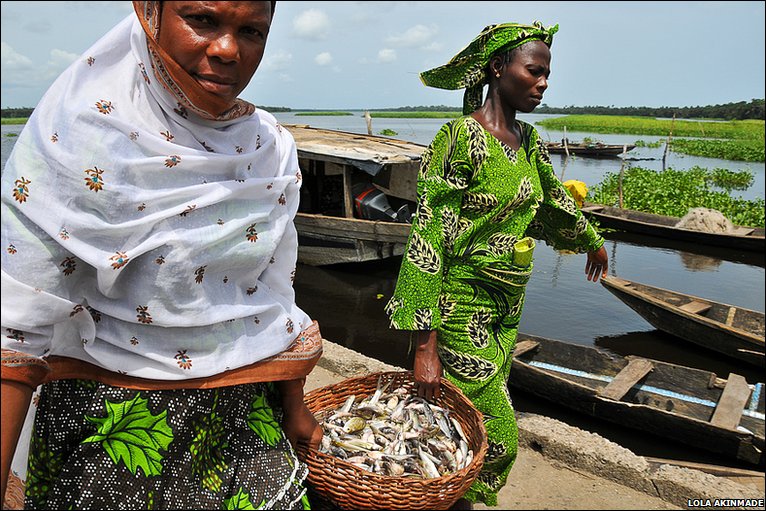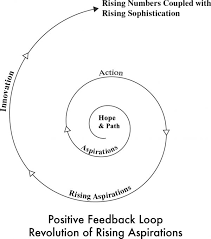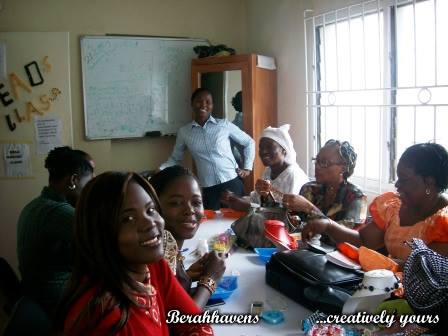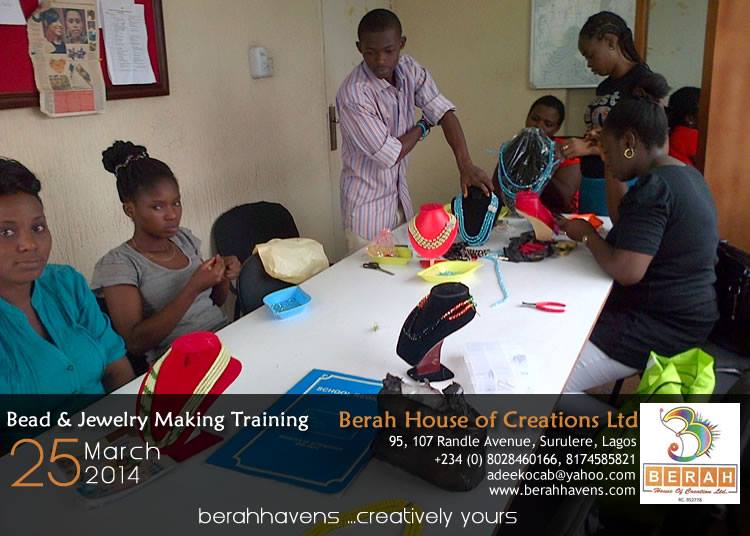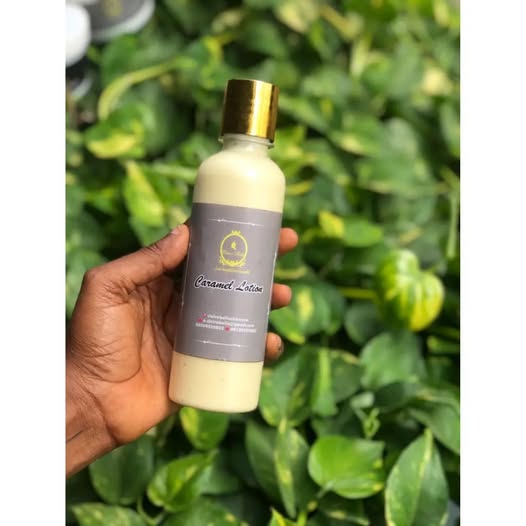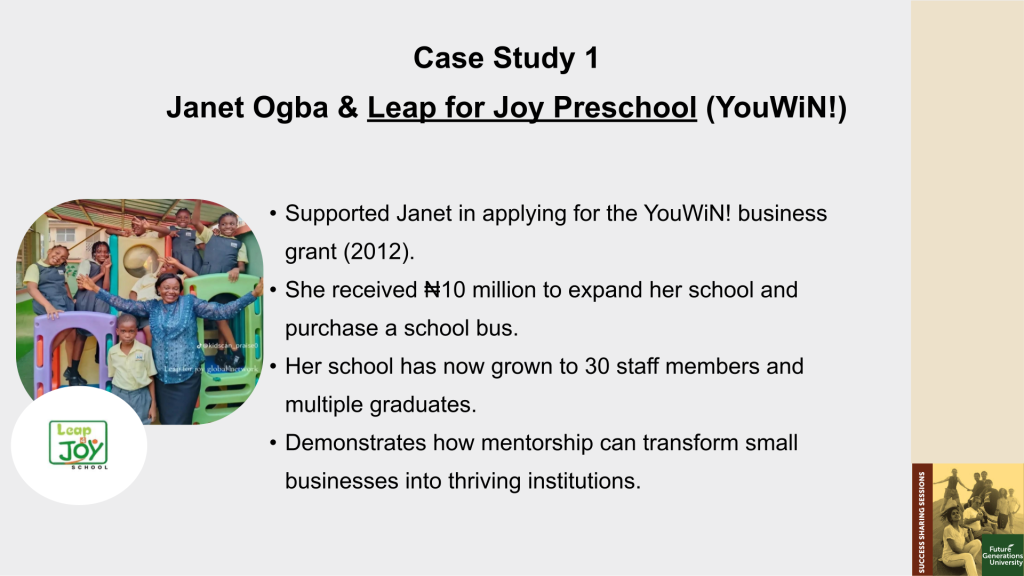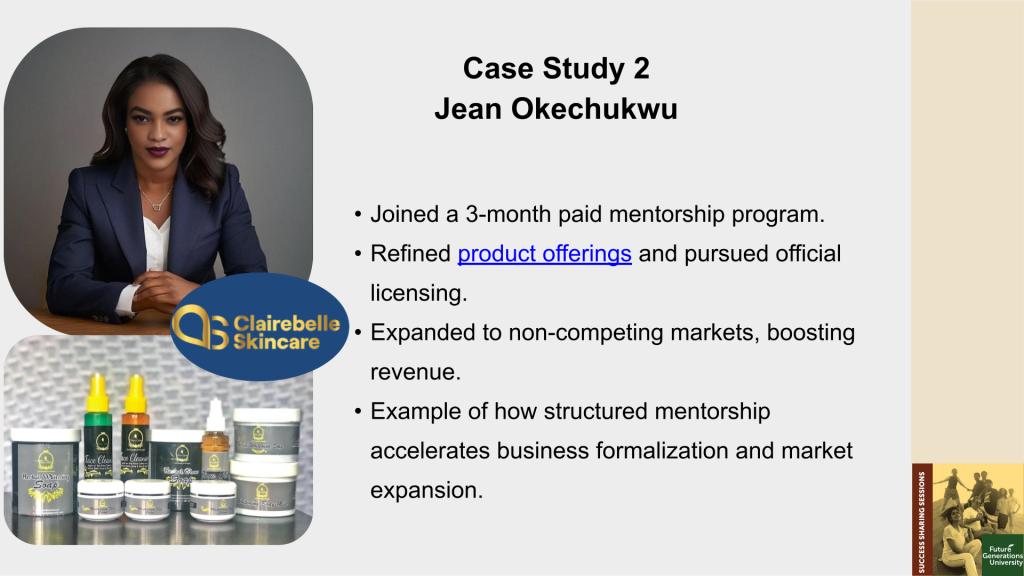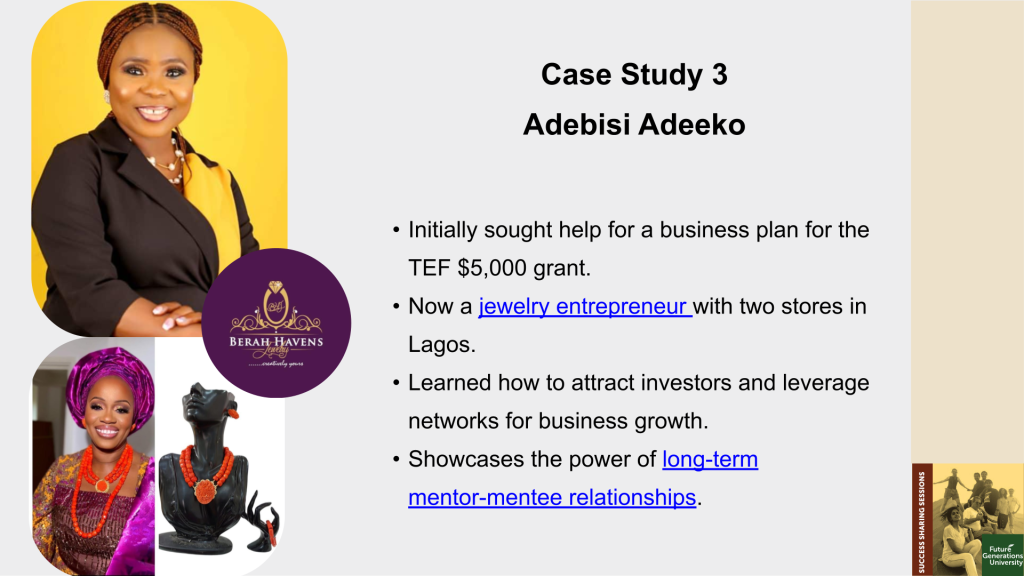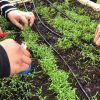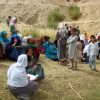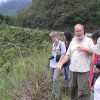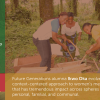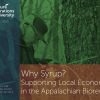International Women’s Day is an important day at Future Generations University. More than a day to recognize women’s accomplishments, it represents a vital opportunity to raise awareness about the ongoing challenges and inequalities that women face globally, such as gender-based violence, discrimination, and lack of representation in leadership positions. It’s a day dedicated to women’s advocacy and self determination. Future Generations was founded on principles of women’s powerful significance to advance community change.
In 2024, the occasion was marked with a look at Future Generations’ legacy expanding opportunities for women and all-day spotlights celebrating University-affiliated women – founding elders, dedicated staff, dynamic partners – women from all over the world who represent pinnacles of achievement and legacies of community change. This year, we invited our global, interconnected network to participate in the inaugural program of a new webinar series, ‘Alumni Success Sharing Sessions,’ which opened with a special emphasis on women, mentorship, and entrepreneurial success.
Why Mentorship?
Mentorship can feel like a luxury. This is often particularly true for women, who face significant barriers in the workplace. Only a little over 50% of women participate in the formal workforce globally, compared to 80% for men. Women have fewer opportunities for business expansion or career progression. Dedicating precious time and energy to mentorship can be a difficult decision – especially for women when balanced against the care work including for family and community that so often falls to them.
Given this context, it’s not always obvious how much impact mentoring can have. While a majority of people agree having a mentor would be beneficial, few have one. According to the Pew Research Center, 63% of women worldwide have never had a formal mentor. Some of these statistics reflect common models of mentorship which often center the narrow confines of business and career advancement, and don’t consider the fuller lived experience and systemic biases women face in and outside the workplace.
Yet, when more women work, economies grow. In a famous study of 62 less-developed nations, Firebaugh and Beck (1994) found a powerful way to promote economic growth and facilitate greater well-being: by investing in women in the formal workforce. Women who not only earn but also control income and economic resources contribute directly to national income growth, while also tending to spend their income in ways that increase the health and human capital of both their own children and the population as a whole. Women’s economic empowerment increases economic diversification and income equality for shared prosperity.
Mentorship is a proven means to achieve career growth reflected in higher salaries, greater raises, exponentially more promotions. For the women mentored by Future Generations alumna Ikwo Oka, the benefits are felt beyond their businesses; her mentorship also impacts their families and wider communities.
Ikwo Oka Found Purpose through Entrepreneurship and Grassroots Mentoring
Ikwo (Udoh) Oka (class of 2005) began her career in a private Health Maintenance Organization (HMO), a for-profit enterprise. Upon entering Future Generations’ graduate program in 2004, she experienced a widening disconnect between her job and her expanding appreciation for community-focused development practices. “I was actually in an HMO, so it was really far apart from what we were doing [in the degree program],” she explained. Her learning journey at Future Generations informed her decision to transition into the nonprofit sector, where she could more actively contribute to social change. Her first major role was with the Planned Parenthood Federation of Nigeria (PPFN) as advocacy manager, focusing on reproductive rights and adolescent health.
At PPFN, Ikwo played a key role in integrating reproductive health services with HIV/AIDS prevention programs. She worked on projects that held the Nigerian government accountable for its commitments to health policies. “The height of it for me was being able to integrate reproductive health into HIV/AIDS, which brought me into the global scene,” she recalled. One of her career highlights was securing a Global Fund Principal Recipient Status for her organization, a prestigious recognition. Despite her successes, Ikwo became disillusioned with the funding practices in large-scale nonprofit projects. She observed that top-down approaches often failed to address the real needs of communities. “It got to a point that I felt it was just a funding mechanism… we were simply just dumping money into a hole and really not impacting lives,” she explained.
After leaving PPFN, Ikwo founded SAYeDEV (Social Advancement for Youth Empowerment and Development), a nonprofit organization dedicated to supporting women entrepreneurs. Recognizing the challenges women face in business—especially in securing grants and formalizing their operations—she expanded her work to include mentorship and capacity-building initiatives. She identified a critical need for structured mentorship programs that empower women to move beyond informal business models. She has been instrumental in guiding women in financial literacy, business planning, grant writing, and growth strategies. “Training and mentorship are very key. More and more women are getting some kind of autonomy to run their businesses based on the training they have acquired over time,” she emphasized. She went on to found and run two additional organizations, Centre for Community Empowerment and Sustainable Development (CESDEV), an economic and social development non-profit that advances low-income women and young people economic self- sufficiency, and The Resource Space, a virtual community hub for business growth.
Applying SEED-SCALE Principles to Expand Opportunities for Women
Ikwo was the first keynote speaker selected for Future Generations University’s Success Sharing Session. She was chosen for her decades of experience mentoring women entrepreneurs and the particular framework she developed that centers mentorship beyond business, through reciprocal and collaborative learning, and that specifically addresses gender biases. What makes Ikwo’s process so extraordinary is the scale at which the women she works with begin to operate – not only growing individually as executives and business owners, but impacting their family dynamics and rippling into the wider community as relationships build and mentees become mentors to others in turn.
In her International Women’s Day presentation, Ikwo credited SEED-SCALE, a community development methodology she learned as a Master’s student, for guiding her approach and contributing to her success.
Ikwo said, “Instead of fighting existing power structures directly, mentorship works best when it builds from success. Using the SEED-SCALE approach, mentorship efforts should amplify what is already working rather than focusing on barriers.” She illustrated this point with an example from her experience working with women in traditional Nigerian communities. There, and in many communities around the continent, it is a widespread cultural norm for family members to work holistically in their family businesses – including children. Thus, for many women and mothers, it is a sacrifice to lose the efforts these young people bring to the family social enterprise and invest additional funds towards their education besides. Deeply understanding this cultural context, Ikwo built trust with the women she worked with – being very flexible with scheduling, meeting women where they were, sharing new ways of thinking. Through Ikwo’s mentorship, these entrepreneurs began to appreciate, for instance, the experience children gain in knowledge and perspective through education – experience they then bring back to the family business helping it not only continue but grow. Ikwo said, “successful mentoring approaches highlight how education benefits their businesses, making the transition to greater gender equity more natural and sustainable. Change happens when communities recognize their own strengths and expand upon them.”
Ikwo draws on the concept and definition of mentoring outlined by Maryann Jacobi that most resonates with her journey as a mentor, noting three commonalities among fifteen definitions:
The Family Sphere: Shifting Dynamics
Ikwo has worked extensively with women in fishing communities, where traditional gender roles often limit economic opportunities. She shared, “In Nigeria, for example, mentoring programs helped women in fishing communities integrate education into business success. The approach encouraged women to see education as an investment in both their business and their children’s future. Through mentorship, they learned cost-effective labor strategies and developed a win-win model, ensuring that businesses thrived while families benefited.”
Many of these women process and sell fish but struggle with financial instability due to informal business practices and the demands of family responsibilities. Some of the facets she brought to her mentorship, depending on the individual needs of her collaborators, include:
- Introduction to financial literacy and business training to help them formalize their businesses while balancing household responsibilities.
- Encouraging child education. Ikwo worked with the community to find ways for children to attend school while still contributing to family businesses. “We showed them how investing in their children’s education would strengthen their businesses long-term,” she noted.
- A key challenge was that many of these women lacked access to funding, and Ikwo helped connect them to grant opportunities designed specifically for women entrepreneurs.
Ikwo’s mentorship approach helps women recognize not only their own entrepreneurial potential but ways to shift their views of family and gender dynamics, resulting in behavior changes that impact the entire family unit. She said, “Women entrepreneurs don’t have to choose between family and business—they both thrive within their communities.”
Whole Community Effects
A defining principle of SEED-SCALE is the idea that expansion from individual action to community change – scaling – is a process informed by ‘positive feedback loops.’ Individual aspirations and actions create a continuous cycle of positive change, seen by more and more community members. This rising quality of life draws in more participants, fueling further improvements to the community at large. It is a mechanism by which one person – a mentor – can impact whole communities.
When Ikwo first met Janet Ogba, Janet was struggling to grow the small preschool she founded, Leap4Joy. The school lacked resources to flourish – transportation, personnel. Ikwo suggested that Janet submit a business grant to address these concerns, but Janet was initially skeptical – she had serious doubts about the system, believing government grants were inaccessible. With Ikwo’s support, Janet changed her mind. She was awarded a YouWIN! Business Grant, receiving ₦10 million to expand her school and purchase a school bus. Today, the school has grown to 30 staff members and multiple students who have gone on to graduate from high school. Ikwo’s mentorship and Janet’s drive transformed a small business into a thriving institution – one that impacts hundreds of children, their families, and the entire community.
Mentorship has a powerful ripple effect—when one woman is mentored, she often in turn mentors another; creating a chain of empowerment that strengthens entire communities.
Ikwo said, “While not all mentorship efforts are formally structured, many mentees go on to integrate what they have learned into their own organizations and networks. This creates a mentorship ripple effect, where mentees become mentors, expanding the reach and impact of each successful mentorship relationship. Mentorship is not just about formal programs—it is about fostering a culture of support, knowledge-sharing, and access to opportunities.”
Ikwo shared the story of one protégé, Adebisi Adeeko, who initially sought help to write a business plan. A member of Ikwo’s church, Adebisi is a talented jewelry designer who needed Ikwo’s help in order to win a grant that could launch her business. “Adebisi Adeeko walked into my office with a smile on her face and said she was told if she could get me to write her business plan she could win the TEF $5000 grant . That relationship has since blossomed into a friendship.
She now knows how to attract investors, leverage networks for market expansion and currently owns two jewelry shops on two luxury high streets in Lagos State and a jewelry training academy.”
Adebisi did win the grant, and she uses her success as a platform to mentor other young women, using her storefronts and training academy to address youth unemployment in Lagos State and Nigeria at large. She is creating employment opportunities and skills training, contributing to the local economy and nurturing the next generation of artisans.
From Entrepreneurship, Climate Action
Ikwo’s most recent mentorship was the result of her role as professional mentor in a three-month paid program. She began working with Jean Okechukwu, a young entrepreneur who had a vision to redefine beauty and care products so that they benefited the planet. Jean’s work, under three dedicated months of Ikwo’s mentorship, allowed her to refine her products, begin the licensure process with Nigeria’s National Food and Drug Agency, and expand into non-competing markets. Jean uses her business success to promote ethical and ecologically renewable practices, striving to “empower individuals to embrace their unique beauty while fostering a healthier, more sustainable planet for generations to come.”
Ikwo is proud of the successes for her friends and collaborators as a result of her mentorship – and she is inspired to continue improving and scaling her own business. Moving forward, she plans to transition mentorship and grant-writing assistance into a paid service, ensuring long-term impact and sustainability for women-led enterprises. “I’ve done a lot of unpaid services… It’s time for a structured approach,” she explained.
Ikwo is not content with the status quo – she sees gaps in mentorship models and the need to foster more opportunities for women entrepreneurs to connect with mentors. She draws on her education and experience to support women through strong supportive relationships, facilitating collaborative action. Her mentorship approach, and her relationships, grow and evolve to meet women in their own context, by design. Ikwo said, “I ensure the process is iterative, involving continuous cycles of reflection, action, evaluation, and adaptation, allowing my mentees to learn and adjust their strategies based on emerging needs and results.”
Ikwo’s work exemplifies a core value upheld by Future Generations University: the commitment to expanding opportunities for women, who are vital agents of change. Ikwo’s impact not only enhances the lives of her mentees, but uplifts their families and communities, fostering a ripple effect of positive, regenerative community transformation.
Watch the recording of Ikwo Oka’s Success Sharing Session
Look for more stories that explore lasting alumni impact on communities, applied strategies that promote equity and new opportunities, dynamics of the care economy, and multi-perspectives from university and sister organizations’ engagement around the planet with commitments to work arm-in-arm respecting cultural contexts and multiple ways of being, thinking, knowing and doing.
